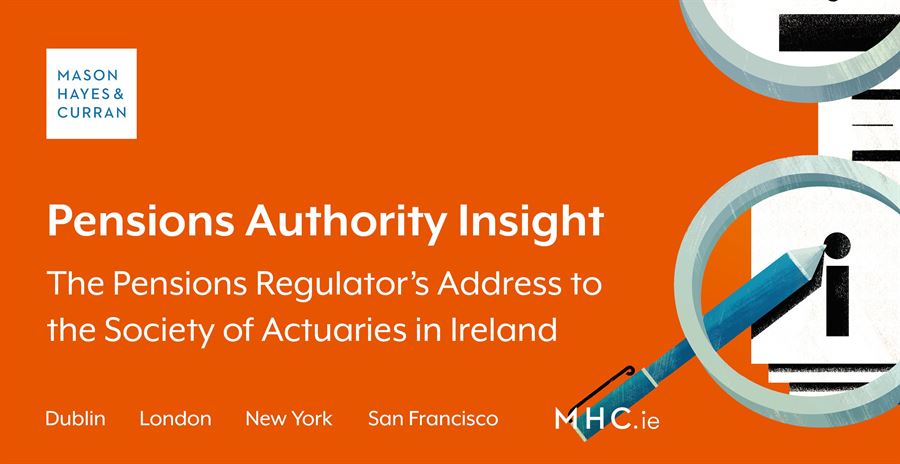
Current activity of the Pensions Authority
The Regulator’s Address, available here, provides an update on the IORP II Directive (the Directive) and confirms that the Department of Employment Affairs & Social Protection is working with the Office of Parliamentary Counsel in completing the transposing regulations. No date or timeline for completion has been indicated.
The Association of Pension Trustees of Ireland, as well as other stakeholders in the single member pension industry, will be watching closely to see if the much debated exemption for single member schemes has been discontinued. The Regulator confirms that the Pensions Authority has begun its programme of engagement, which was announced before the COVID-19 pandemic, with selected schemes. Our analysis of the engagement programme announcement can be found here.
The Regulator also notes that the Pensions Authority has been working with the Society’s Pension Committee on defined benefit (DB) issues including risk assessment, transfer value bases, Covid-19 issues and practising certificates.
 The future of defined benefit supervision
The future of defined benefit supervision
The Regulator asserts that as the aim of DB schemes is to have sufficient benefits available to pay benefits as required by the scheme rules, the purpose of the Pension Authority’s supervision must be to ensure that this goal is realised. This, he suggests, will be achieved by the Pensions Authority anticipating each scheme’s future solvency requirements and the Regulator makes the point that the trustees of DB schemes must adopt a similar approach.
The Pensions Authority’s approach will focus on each scheme’s weaknesses and any deficiencies in the management of the scheme. The aim is to assess the threat that these issues represent to the eventual payment of member benefits. Where such threats are identified and not addressed by the trustees, the Pensions Authority will take action in line with the requirements of the Directive.
The Regulator suggests that for the trustees of many DB schemes, the protection of member benefits is not presently the priority that it should be. The Regulator states: “It is clear therefore that, for very many schemes, we need to change the culture of trusteeship. We need, and will expect, trustees to assess objectively the scheme’s situation, to proactively identify weaknesses and shortcomings, and address them.” However, the Regulator adds that the Directive should not trouble those trustees that are currently meeting their responsibilities as set out in the Directive.
The Regulator then informed the Society that the Pensions Authority will commence a categorisation of DB schemes into the following:
-
Category 1: schemes likely to meet their obligations
-
Category 2: schemes that have a significant risk for member benefits unless certain practices are changed
-
Category 3: schemes unlikely to meet their obligations to pay benefits
The Regulator has indicated that “We have seen very few schemes that we think are Category 1……I suspect that there are many schemes, that assume they are Category 1 that will be surprised.”
The funding standard
The Regulator’s address also mentions the inadequacy of the existing funding standard for DB schemes. He supports this by referring to the numerous wind-ups and deficit-related issues that have occurred over the past number of years. In stating that a DB scheme is too complex for just one number or measure of financial health, he confirms that the Pensions Authority will instead look at three separate measures to allow an objective analysis of the scheme’s ability to pay benefits; these are solvency, risk and sustainability.
While the funding standard will remain along with the relevant trustee obligations pertaining to it, the additional measures are aimed at capturing a wider range of scheme issues that will need to be addressed.
Scheme actuaries
The Regulator asks that scheme actuaries assist trustees in understanding the new environment and he anticipates that this may often entail the breaking of unpleasant news to trustees. The necessity for cultural change and objective assessments are mentioned on several occasions throughout the address. It is clear that the Pensions Authority is aiming to introduce a broadened set of metrics for assessing a DB scheme’s ability to meet benefits which will be underpinned by an objective standard and not a subjective rationalising one.
Comment
In the Regulator’s address to the Society, trustees of DB schemes have been provided with something of a forewarning. As well as the transposing regulations for the Directive, the industry can expect to see a proactive and engaged Pensions Authority that will look to implement a new set of metrics and objective standards for DB schemes, which in many cases may result in categorisations that will come as a surprise to some trustees. For trustees of all scheme types it would be prudent to address any concerns or identified scheme weaknesses now and not wait until such issues are highlighted to them by the Pensions Authority.
For more information, contact a member of our Pensions team.
The content of this article is provided for information purposes only and does not constitute legal or other advice.






